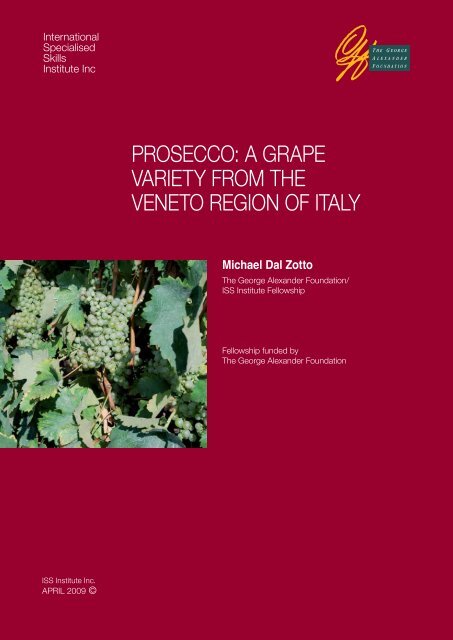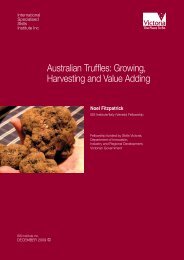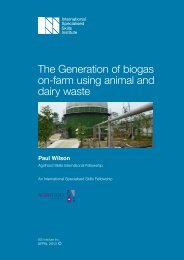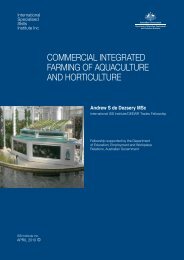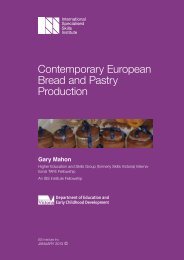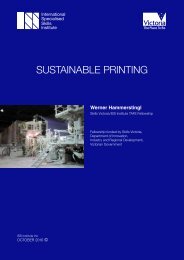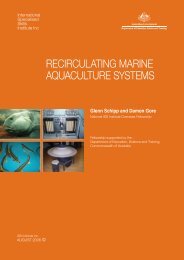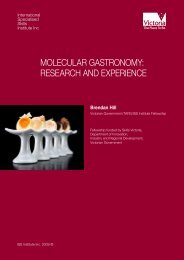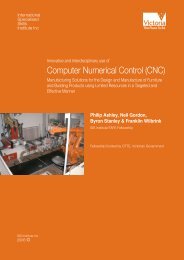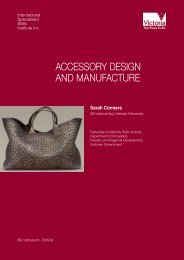prosecco: a grape variety from the veneto region of italy
prosecco: a grape variety from the veneto region of italy
prosecco: a grape variety from the veneto region of italy
You also want an ePaper? Increase the reach of your titles
YUMPU automatically turns print PDFs into web optimized ePapers that Google loves.
International<br />
Specialised<br />
Skills<br />
Institute Inc<br />
PROSECCO: A GRAPE<br />
VARIETY FROM THE<br />
VENETO REGION OF ITALY<br />
Michael Dal Zotto<br />
The George Alexander Foundation/<br />
ISS Institute Fellowship<br />
Fellowship funded by<br />
The George Alexander Foundation<br />
ISS Institute Inc.<br />
APRIL 2009 ©
International<br />
Specialised<br />
Skills<br />
Institute<br />
ISS Institute<br />
Suite 101<br />
685 Burke Road<br />
Camberwell Vic<br />
AUSTRALIA 3124<br />
Telephone<br />
03 9882 0055<br />
Facsimile<br />
03 9882 9866<br />
Email<br />
issi.ceo@pacific.net.au<br />
Web<br />
www.issinstitute.org.au<br />
Published by International Specialised Skills Institute, Melbourne.<br />
ISS Institute<br />
101/685 Burke Road<br />
Camberwell 3124<br />
AUSTRALIA<br />
April 2009<br />
Also extract published on www.issinstitute.org.au<br />
© Copyright ISS Institute 2009<br />
This publication is copyright. No part may be reproduced by any process except in accordance<br />
with <strong>the</strong> provisions <strong>of</strong> <strong>the</strong> Copyright Act 1968.<br />
Whilst this report has been accepted by ISS Institute, ISS Institute cannot provide expert peer<br />
review <strong>of</strong> <strong>the</strong> report, and except as may be required by law no responsibility can be accepted<br />
by ISS Institute for <strong>the</strong> content <strong>of</strong> <strong>the</strong> report, or omissions, typographical, print or photographic<br />
errors, or inaccuracies that may occur after publication or o<strong>the</strong>rwise. ISS Institute do not accept<br />
responsibility for <strong>the</strong> consequences <strong>of</strong> any action taken or omitted to be taken by any person as<br />
a consequence <strong>of</strong> anything contained in, or omitted <strong>from</strong>, this report.
Executive Summary<br />
Since <strong>the</strong> 1980s <strong>the</strong> King Valley wine <strong>region</strong> <strong>of</strong> Victoria has been gaining a reputation for<br />
growing many different Mediterranean <strong>grape</strong> varieties. It is through <strong>the</strong> forward thinking<br />
and innovative approach <strong>the</strong> wine industry has taken that as consumers we are given <strong>the</strong><br />
opportunity to taste such varieties as Pinot grigio, Arneis, Albarino, Sangiovese, Barbera,<br />
Nebbiolo and Prosecco. The focus <strong>of</strong> this Fellowship was Prosecco, a <strong>grape</strong> <strong>variety</strong> <strong>from</strong><br />
<strong>the</strong> Veneto <strong>region</strong> <strong>of</strong> Italy.<br />
Prosecco is a sparkling wine that finds its origins in <strong>the</strong> north east <strong>of</strong> Italy in <strong>the</strong> hills<br />
<strong>of</strong> Conegliano and Valdobbiadene and has been grown <strong>the</strong>re for at least two centuries.<br />
Some say it was originally known as Pucino in <strong>the</strong> time <strong>of</strong> <strong>the</strong> Roman Empire. The <strong>variety</strong><br />
produces a sparkling wine that ranges <strong>from</strong> <strong>the</strong> brut style to <strong>the</strong> Cartizze, which is a<br />
particularly sweet style that will range <strong>from</strong> frizzante to sparkling depending on <strong>the</strong> level <strong>of</strong><br />
carbonation in <strong>the</strong> wine.<br />
The Dal Zotto family has a very strong connection with this <strong>variety</strong> in that Ottorino Dal Zotto,<br />
Michael Dal Zotto’s fa<strong>the</strong>r, is <strong>from</strong> <strong>the</strong> Valdobbiadene area <strong>of</strong> Veneto. In 2000, <strong>the</strong> Dal Zotto<br />
family planted <strong>the</strong> first Prosecco vines in <strong>the</strong> King Valley in <strong>the</strong> north east <strong>of</strong> Victoria and in<br />
2004, released <strong>the</strong> first commercial Prosecco in Australia. It is this connection to <strong>the</strong> <strong>variety</strong><br />
that has driven Michael Dal Zotto to gain a more extensive knowledge <strong>of</strong> <strong>the</strong> <strong>variety</strong> <strong>from</strong><br />
both a viticultural and winemaking aspect – to build his own brand and to make <strong>the</strong> findings<br />
<strong>from</strong> his overseas study program available to o<strong>the</strong>r wineries and those wishing to enter <strong>the</strong><br />
Prosecco market. This is in line with his vision to see Prosecco grow into an Italian <strong>variety</strong><br />
that is embraced both by consumers and winemakers within Australia.<br />
The skills deficiency that <strong>the</strong> Fellowship focused on was to develop a greater understanding<br />
<strong>of</strong> Prosecco winemaking, viticulture and marketing. That being <strong>the</strong> gaining <strong>of</strong> knowledge<br />
in establishing quality parameters to determine harvest <strong>of</strong> fruit and product position, <strong>the</strong><br />
selection <strong>of</strong> <strong>the</strong> sites for establishing vineyards and winemaking techniques in particular<br />
relating to <strong>the</strong> charmat method. This method is used in <strong>the</strong> production <strong>of</strong> almost all Prosecco<br />
in <strong>the</strong> <strong>region</strong>. During this time <strong>the</strong> Fellow developed additional knowledge about which style<br />
<strong>of</strong> Prosecco was <strong>the</strong> most popular within <strong>the</strong> markets it was distributed in.<br />
During his time in Italy <strong>the</strong> Fellow visited wineries and vineyards in both <strong>the</strong> Conegliano and<br />
Valdobbiadene areas <strong>of</strong> Veneto. He spoke to viticulturalists and winemakers and discussed<br />
<strong>the</strong> principles about <strong>the</strong> growing and making <strong>of</strong> Prosecco, toge<strong>the</strong>r with <strong>the</strong> growth in<br />
popularity <strong>of</strong> Prosecco as a wine on a global scale. This <strong>region</strong> was chosen as it is <strong>the</strong> only<br />
<strong>region</strong> were Prosecco is grown, however, during <strong>the</strong> trip <strong>the</strong> Fellow observed that <strong>the</strong> <strong>region</strong><br />
had expanded to as far as Trieste.<br />
This was all achievable through <strong>the</strong> help <strong>of</strong> <strong>the</strong> oenological school in Conegliano and <strong>the</strong><br />
Institute <strong>of</strong> Experimental Viticulture (also in Conegliano), that organised for <strong>the</strong> Fellow to visit<br />
various wineries, vineyards and consortiums.<br />
The Fellow’s learning reinforced <strong>the</strong> knowledge that different clones influence flavour and<br />
that certain clones assist in aromatics and flavour, whereas o<strong>the</strong>r clones provide more<br />
palate structure. This demonstrated <strong>the</strong> need to import various clones to assist in <strong>the</strong><br />
making <strong>of</strong> a complete wine. Using <strong>the</strong> knowledge gained, <strong>the</strong> Fellow proposes to work<br />
with sommeliers (wine stewards) in helping to promote <strong>the</strong> <strong>variety</strong> within <strong>the</strong> Food and Wine<br />
Industry in Australia.<br />
Since completing <strong>the</strong> overseas study tour, <strong>the</strong> Fellow has made himself available to <strong>the</strong><br />
general winemaking industry, <strong>the</strong> AgriFood Industry Skills Council, industry bodies and<br />
educational institutions, for <strong>the</strong> sharing <strong>of</strong> <strong>the</strong> skills, knowledge and insights he has learned<br />
during <strong>the</strong> Fellowship.


